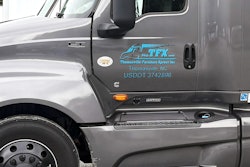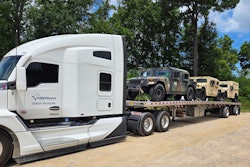Attending the always insightful FTR Transportation Conference 2025 in Indianapolis the week of Sept. 8, I must have heard the term “uncertainty” more than a million times from shippers, carriers, and analysts. While today certainly presents challenges when predicting freight’s future, I discussed in a panel with Penske’s Paul Rosa and DTNA’s Sean Waters the fact that trucking has always faced uncertainty, and those who purposely navigate uncertainty win out over those who merely react to it.
When, exactly, did freight have certainty in the past? Seriously.
Perhaps it was in October 1973 for just a few minutes before OPEC embargoed oil to the U.S., before fuel prices skyrocketed and fuel shortages impacted everyone, including freight haulers.
Or maybe it was in those precious seconds as the ink on Jimmy Carter’s signature on the Staggers Rail Act and the Motor Carrier Act of 1980 was drying? What followed was the deregulation of both rail and trucking and a massive upheaval in both for the next decade.
Maybe it was as Bill Clinton signed the Interstate Commerce Commission Termination Act in 1995. That piece of legislation also revised the hours-of-service rules, mandating a maximum of 11 hours of driving. Or perhaps freight had certainty in those brief moments before Clinton rescinded the national 55 mph speed limit that year, signing the National Highway System Bill.
I seem to recall there was some certainty in freight just before Cummins, Mack, Volvo, Detroit Diesel, Caterpillar, etc., signed the 1998 Consent Decree, introducing NOx emission requirements and accelerating their market introduction to 2002 from the legislated 2004 timing. That created all that fun with the introduction of EGRs, remember?
Conceivably, freight had certainty in that glorious run-up period before the dot-com bubble burst in March 2000. I seem to recall massive investment in medium-duty delivery trucks by carriers, and even many OEMs started plans to build new vehicle platforms to cater to that industry. In the two and a half years that the U.S. endured the crash of the speculative technology and e-commerce markets, no one knew where the floor was. Many bankruptcies hit the freight market.
In the midst of that freight market nightmare, didn’t we also have 9/11? Wow, the start of the 20-year war on terror and all it meant to freight markets, shipping routes, and procedures. I’m sure we had a moment or two of freight clarity in that time period, but I can’t recall when that was.
Oh, yeah, it was in 2006 when every shipper and truck dealer in the U.S. was buying trucks like there was no tomorrow in anticipation of the 2007 model year trucks that would be massively more expensive and, frankly, full of emission systems problems. Then January 2007 came and, to everyone’s surprise, no one needed to buy new trucks, and used trucks were severely unneeded. The truck market crash of 2007 would have been tremendous, but it was closely followed by the even more disturbing Great Recession of 2008-2009.
Diesel fuel prices first spiked to close to $5/gal., making oil company executives happy, but then crashed to the floor as freight markets evaporated, companies went bankrupt, and supply chains dribbled freight.
There was that brief time in 2012-2013 where freight carriers were happily paying more than $4/gal. for diesel. I’m sure that particular certainty was not appreciated by carriers, but it was stable. Projections on fuel at that time were that it would go well beyond $5/gal. in the future. But then 2014 hit and fuel prices fell off a cliff, getting into the $2/gal. range. Executives at the big oil companies were probably frantic.
I’m absolutely sure there were certain times in 2016-2020, somewhere between massive changes in tax laws, tariffs, huge increases in payroll costs for truck drivers as carriers had to compete for drivers, and increased costs for trucks as demand spiked in 2018—I swear there was some short time in there somewhere where freight certainty was occurring. I just can’t recall it at the moment.
Then 2020 hit. Wow. Talk about an amusement park freight rollercoaster ride. First, the COVID pandemic started killing thousands of people, then the subsequent shutdowns forced people out of work in droves, then people discovered they could buy things on the internet and have trucks deliver them to their houses—truck drivers suddenly became heroes. And amid all that, Ukraine was invaded, the world supply chain fell apart, ships started backing up in San Pedro, and on and on. Clearly not much freight certainty then.
Now it’s 2025. Deregulatory forces are impacting long- and short-range planning. And there is all this new, competing, production-level technology to choose from. Even Tesla finally has its 2017-announced battery-electric truck hitting the market and a factory emerging in Nevada that can build 50,000 units a year. Cummins introduced a 15L natural gas engine that can compete directly with diesels, even in long, heavy hauls. Hyundai is even introducing a production fuel cell truck, slipping into the void created when Nikola imploded. Then there is Windrose and other startups hitting the U.S. market.
Kiss freight certainty goodbye.
So, when were you certain about anything in trucking?
Let’s move past reacting to uncertainty and get on with navigating it, like freight always has.
How do we navigate? Here are some suggestions.
- Concentrate on facts. Understand through data how your trucks are operating. Don’t accept opinions or arm-waving historical memory. Make use of telematics data to know your own trucks, loads, drivers, customers, and facilities. Recognize that changes are occurring in freight flows.
- Focus on efficiency improvement to get cost reductions and improve profits. This may mean making new capital investments in technology in a down market. Invest for the future, not the past. Reduce empty runs, underutilized assets, and aging, inefficient equipment. Train people to spot efficiency opportunities and empower them to take action.
- Make use of industry information sources. Don’t go it alone. NACFE, FTR, ACT Research, Geotab, and many others are there. Use the information available to you.
Save the uncertainty discussions for Friday happy hour while we can revisit things that Bruce Springsteen celebrates in the song "Glory Days."











